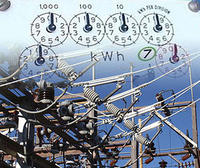-
Indonesia joins countries mulling BlackBerry ban to fight terror
Indonesia considers joining a growing list of countries, including India, Saudi Arabia and the UAE in banning BlackBerry devices; Research in Motion is receiving increasing pressure to allow government access to data generated by the hand-held devices
-
-
Smart Grid offers target-rich opportunities for hackers

SCADA systems are vulnerable to hacking, but the smart grid is even more vulnerable; security experts at the Black Hat conference in Las Vegas last week warned that the accelerated deployment of smart-grid technology could leave critical infrastructure and private homes vulnerable to hackers; hacking may come in a benign form — customers might simply figure out how to lower their electricity bills by manipulating how much energy their meters say they are using; hacking may also have more sinister aspects: large-scale attacks may also be possible, and the smart grid’s serious vulnerabilities make it possible to shut down the power supply to an entire city
-
-
New identity theft scheme: stealing kids' Social Security numbers
The latest identity theft scheme: stealing kids’ Social Security numbers years before these kids grow up to use these numbers; the scheme allows people to establish phony credit and run up huge debts — debts that the kids may never be able to pay off
-
-
U.S. "cyber flank" exposed

Former head of the CIA and the NSA warns the U.S.“cyber flank” was exposed and it was losing clout to influence rules of war on the Internet; “Our flank is totally exposed,” Michael Hayden said at the Black Hat computer security gathering in Las Vegas, comparing the U.S. tactical position on the Internet to a battle of land troops; “If tomorrow they show up on that flank they are going to roll down.”; the retired general said he was in “absolute awe and wonderment” at the Chinese cyber espionage campaign but that they were certainly not the only nation doing it; he faulted an Internet built on the premise of quickly and freely sharing information for creating an open landscape that gives attackers an edge over defenders
-
-
Hacker built, and demonstrated, a $1,500 cell-phone tapping device
Security researcher demonstrated a device, which he built for just $1,500, which can intercept some kinds of cell phone calls and record everything that is said; the attack illustrates weaknesses in GSM, one of the world’s most widely used cellular communications technologies
-
-
First Cyber Security Challenge winner announced
The United Kingdom suffers from a dearth of cybersecurity experts; several private and public organizations have launched the Cyber Security Challenge competition — a series of challenges and games that would test the talent and skills of people; the challenges is built around eight key skill areas which include digital forensics, network analysis, and logical thinking
-
-
ATMs easily compromised by hacker at Black Hat
A disturbingly high percentage of the world’s automated teller machines (ATMs) are vulnerable to physical and remote attacks that can steal administrative passwords and personal identification numbers, to say nothing of cash
-
-
Identifying future digital leakers, whistle-blowers
Digital encoding could catch future informants; the Wikileaks saga will likely result in an overhaul of how governments protects information; in addition to using watermarking, government agencies could adapt existing digital-rights-management technologies; such technologies can perform various tasks that might be relevant: identify when the same computer is downloading voluminous amounts of material, restrict downloading to authorized users, and stop users from copying or passing restricted files to other computers
-
-
New cybersecurity threat: smartphone apps that do more than what they say they do
A large proportion of applications contain third-party code with the capability to interact with sensitive data in a way that may not be apparent to users or developers; Apple reviews its applications before accepting them into its App Store, but even that is not foolproof when it comes to detecting erroneous or malicious components within apps, which might end up collecting or storing information that has nothing to do with the intended usage case of the app
-
-
Five hot topics to be discussed at Black Hat and Defcon
Among the many topics to be discussed at Black Hat, which opens today, and DefCon, which opens Friday, is SCADA networks vulnerability; many of these networks have developed a no man’s land between IT and industrial systems, and these networks’ computers are often at risk because nobody seems to take complete ownership of them; there will be a talk about where bugs show up in the infrastructure; the speaker is Jonathan Pollet, whose company, Red Tiger Security, has collected data on 38,000 vulnerabilities — and the types of exploits that have been written for them
-
-
Breakthrough: UCLA engineering devises new location-based cryptography method
Location-based security is ensured by using quantum mechanics; this type of cryptography could be useful in several settings — for example, one could communicate with a military base with a guarantee that only someone physically present at the base will have access to the information; furthermore, the location-based method eliminates the need for distributing and storing keys, one of the most difficult tasks in cryptography
-
-
First puzzle of U.K Cyber Security Challenge competition cracked
The United Kingdom suffers from a dearth of cybersecurity experts; several private and public organizations have launched the Cyber Security Challenge competition — a series of challenges and games that would test the talent and skills of people; the challenges is built around eight key skill areas which include digital forensics, network analysis and logical thinking; enthusiasts claim they have already solved he first test of the challenge
-
-
Black Hat opens Wednesday in Las Vegas, DefCon to follow Friday
Black Hat, one of the more important cybersecurity event, opens this Wednesday in Las Vegas; Black Hat gives way on Friday to DefCon, “Black Hat is a place where security researchers go to show off their work and get peer feedback,” said Jeff Moss, who founded and runs both gatherings; “DefCon is the fun stuff they don’t have time to do in their day jobs”; DefCon’s array of activities includes a lock picking village and a “capture the flag” contest to see who can break into a computer network and fend off rivals
-
-
New report: Apple software has the most vulnerabilities
The usual suspects lead the list of software makers whose software come with most vulnerabilities — Apple, Microsoft, Oracle, and Adobe; new vulnerabilities report offers support to the notion that a high market share correlates with a high number of vulnerabilities
-
-
Dell to replace server parts infected with virus
Dell says W32.Spybot worm was found in replacement motherboards, and that it will replace infected parts with clean motherboards; the company says it is unaware of any attacks as result of infections
-
More headlines
The long view
Researchers Develop AI Agent That Solves Cybersecurity Challenges Autonomously
New framework called EnIGMA demonstrates improved performance in automated vulnerability detection using interactive tools.
